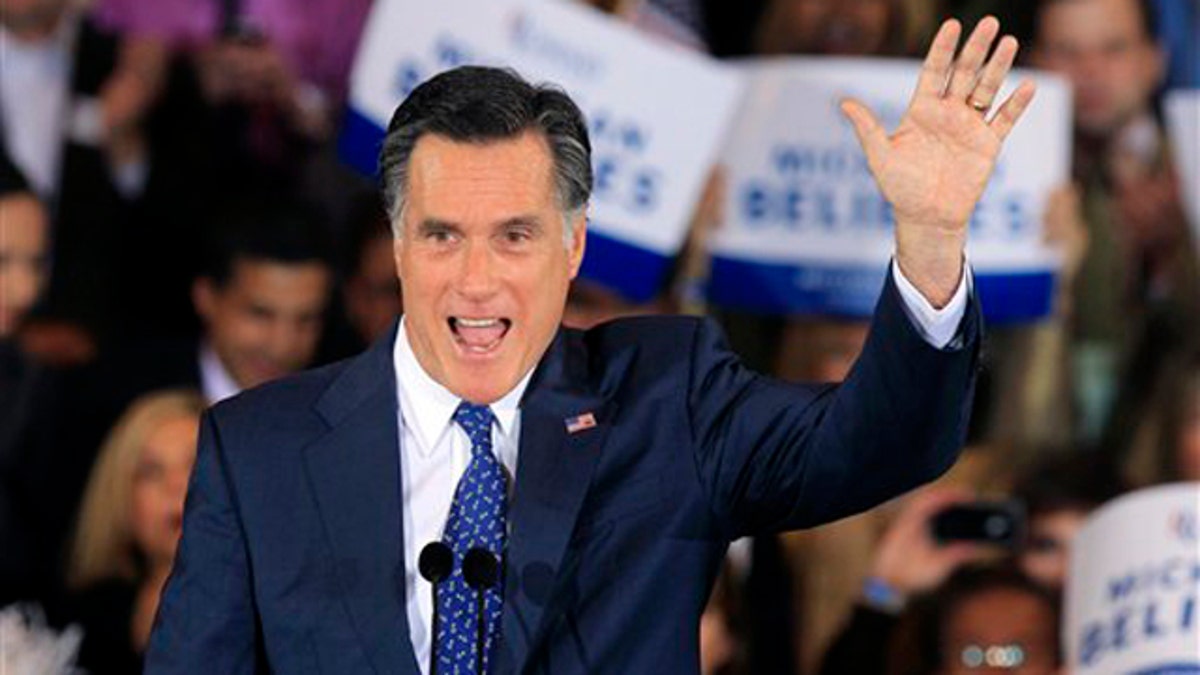
Feb. 28, 2012: Mitt Romney waves at his election night party in Novi, Mich. (AP)
Say this for Mitt Romney: He won. Although no one thought a few weeks ago that would be anything to brag about in Michigan.
Romney came back to edge Rick Santorum in his home state that he won handily in 2008.
He should now avoid the consequences of a Michigan loss: the desperate pleas for another candidate to get in the race, a major downdraft in fundraising and intense pressure for a campaign shakeup.
Otherwise, he is slouching toward Tampa in what still projects as a drawn-out slog for delegates.
Last week, Romney stumbled upon an unfortunate metaphor for his campaign when he gave a much-hyped economic speech at Ford Field, where the Detroit Lions play.
The content of his talk was overwhelmed by commentary about the staging. Romney and his audience occupied one end of the field. From the right angle, it looked like a nice crowd and Romney spoke against a professional-looking backdrop.
However, from another perspective, all the vast emptiness of the stadium was visible and the event had a Potemkin feel.
There was a sense that Romney wasn't filling out his role as the frontrunner. On top of that, he added to his catalogue of clumsy statements by saying his wife drives a couple of Cadillacs, a line that got more attention than any of his economic proposals.
But, in the end, he won (and out in Arizona, won overwhelmingly). Al Davis would tell you nothing else matters. Given how genuinely delighted and relieved he seemed during his victory speech, Romney must be inclined to agree. He was practically glowing.
In Michigan, Romney ran ads just negative enough to hurt Santorum--who had surged to a lead in Michigan after his surprise victories in Minnesota, Missouri, and Colorado--without suffering undue backlash. He needled his way to victory in the debate last week, pushing Santorum on all it is about his record as a senator that doesn't accord with his image as a conservative purist.
Romney retained his strengths on the economy and electability according to exit polls, and held his own among Tea Party supporters and conservatives.
The challenge for Santorum has been to widen out from his ideological base among very conservative voters, strong supporters of the Tea Party, and evangelicals.
That's a formidable bloc in a Republican primary, but Santorum needs more. Although his message has been pitched to working-class voters, it's not clear whether it has hit home. If he did a little better than Romney with voters making less than $100,000 and with voters who don't have a college degree, it wasn't enough to be decisive.
He and Romney are a study in contrasts. Santorum the widely dismissed underdog versus Romney the frontrunner; Santorum’s shoestring operation against Romney’s proficient organization; Santorum’s passionate and sometimes blustery stump performances and interviews in contrast Romney’s buttoned-up-to-a-fault presentations. Santorum’s gaffes are a product of speaking his mind, Romney’s of straining too much to connect.
Ohio on Super Tuesday next week will be a fairer test between the two candidates, since Romney won’t have a home-field advantage.
Santorum was hoping to be powered by two or three days of positive publicity out of Michigan that won’t be available to him.
Romney will now try to grind his way to the 1,144 delegates necessary for the nomination, despite weakness in the South and Midwest.
Santorum and Gingrich will try to keep him short of that in hand-to-hand combat over every delegate and hope either that somewhere along the way he folds in a way he didn't when facing near-death experiences in Florida and Michigan, or that something turns up at a contested convention.
Someone tweeted last night, quoting Churchill, that nothing is so exhilarating as being shot at with consequence. For now, Mitt Romney is experiencing the thrill of a bullet having barely missed.
Rich Lowry is editor of The National Review and a Fox News contributor.








































